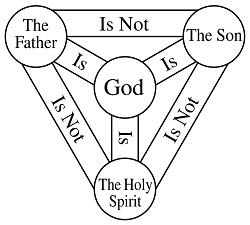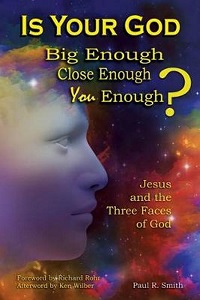|
TRANSLATE THIS ARTICLE
Integral World: Exploring Theories of Everything
An independent forum for a critical discussion of the integral philosophy of Ken Wilber
  Frank Visser, graduated as a psychologist of culture and religion, founded IntegralWorld in 1997. He worked as production manager for various publishing houses and as service manager for various internet companies and lives in Amsterdam. Books: Ken Wilber: Thought as Passion (SUNY, 2003), and The Corona Conspiracy: Combatting Disinformation about the Coronavirus (Kindle, 2020). Frank Visser, graduated as a psychologist of culture and religion, founded IntegralWorld in 1997. He worked as production manager for various publishing houses and as service manager for various internet companies and lives in Amsterdam. Books: Ken Wilber: Thought as Passion (SUNY, 2003), and The Corona Conspiracy: Combatting Disinformation about the Coronavirus (Kindle, 2020). Trinitarian SpeculationsGod in the Integral AgeFrank Visser
But of course, classifying our experiences (or projections?) doesn't prove divinity at all. It only structures our religious experiences.
All major world religions know something like the Trinity. They all teach that God is one, but as a manifest God He is three. Even the non-theistic religions such as Buddhism have some metaphysical trinity which serves the same purpose. This is not to say they all mean the same thing, but a case can be made that these different versions refer to some deeper universal element in religious views of existence. Christianity, of course, has the Father, the Sun and the Holy Spirit. Esoteric Judaism talks about Kether, Chochmah and Binah. Hinduism has its Shiva, Vishnu and Brahma, or more philosophically: Sat-Chit-Ananda. And so on, and so on. Mahayana Buddhism speaks of the Dharmakaya, the Sambhogakaya and the Nirnamakaya. Sometimes a fourth element is acknowledged, Power, Mother or Matter, which is seen as feminine and complements the (often male) Trinity. This power is active in manifest nature.  The "Shield of the Trinity" or Scutum Fidei diagram of traditional medieval Western Christian symbolism Trouble starts when these abstractions are made more concrete. Who, for example is the Creator in Christianity? In Hinduism it is Brahma, the third Person of the Trinity. To be consistent, the Christian Spirit should have the role of creator, but most Christians would ascribe this role to the Father principle. "God the Father is a title given to God in various religions, most prominently in Christianity. In mainstream trinitarian Christianity, God the Father is regarded as the first person of the Trinity, followed by the second person God the Son (Jesus Christ) and the third person God the Holy Spirit. Since the second century, Christian creeds included affirmation of belief in "God the Father (Almighty)", primarily as his capacity as "Father and creator of the universe".[1] (Wikipedia) And most theologians see the role of the Holy Spirit more in the community life of the believers than in creating the cosmos. What is more, the major schism in Christian history in 1054, known as the "East-West Schism", revolved precisely around the exact role of the Spirit and its relationship to the other two Persons: did the Holy Spirit come from the Father or the Son? The Eastern-Orthodox Church chose the former, the Western-Roman Church the latter option. So we should not draw too hastily our conclusions in our search for universals. This was a veritable theological battlefield, with historical consequences. However, fortunately, we will not be entering this theological jungle here. PERSON TO PERSONLooking for human universals, Ken Wilber has often argued that all languages recognize three so-called "persons", so this must be the place to look for fundamental ways to slice up reality and experience. Here's an example from a column on Belief.net:
Here's a simple example. Notice that all the world's mature languages contain first-, second-, and third-person pronouns. First person means the person who is speaking (I, me, we); second person means the person spoken to (you, thou); and third person means the person or thing being spoken about (him, her, it). So if you are talking to me about your new car, you are the first person, I am the second person, and the car is the third person.
These pronouns actually represent three perspectives that human beings can take when they talk about the world or attempt to know the world. For example, I have my first-person impressions of my new car ("I like it!"). I can ask you, a second person, what you think about it ("I like it, too!"). You and I are now a "we" (a first-person plural) and we both agree, the car ("it") is great! Although there are obviously countless combinations here, it's sometimes useful to summarize these three major perspectives as I/me, you/we, and he/her/it-or simply "I," "we," and "it." So what? Well, the fact that every major language contains these three types of pronouns means that we have a set of "meta-universals" here, or something that we find in all major cultures. Here as well, major disagreements have sprung up about the precise nature of these three persons (have a look in the Reading Room of Integral World for a first impression). Some authors have argued that neither the simplified scheme of I We and It, nor the original four quadrants model from which it has been derived, leave any room for a truly personal dimension of You. Others have argued that "It" is a very impoverished way to speak of the third person dimension (which technically includes both He, She and It, in singular and plural). This could have resulted in a major schism within the integral religion, but apparently there wasn't enough opposition to upset the mainstream view.
These two tables show how artificial and contrived the "I, We, It" scheme really is.
The real reason behind this tripartite division of personal pronouns might be quite different from all these trinitarian speculations. I have covered these in a separate essay.[2] They are related to the distance a person has to the speaker. We can speak only to those who are within hearing distance, but those farther away can only be referred to in third person language. The Return of the YouBut if this You-dimension has been somewhat obscure in both the four quadrant model as the Big Three of I, We and It (which Wilber denies to this very day), it has made a strong comeback in Wilber's elaboration of theistic religion, which takes God to be a personal You of cosmic proportions. Westerners, he claims, are often fine with an inner god or a God behind nature, but balk when they are confronted with the notion of a divine Person (be that a guru or God himself). But in the integral model of reality there is room for a Spirit-as-You. In Integral Spirituality (2006) Ken Wilber introduced this 1-2-3 approach to the God-problem. Since everything can be classified with the four quadrant model, which later got simplified with the Big Three of I, We and It, it follows that the God-concept can be subdivided as well into three components:

This rather dense terminology has been simplified recently by theologian Paul Smith in his book Is Your God Big Enough? (2017), who was interviewed by Ken Wilber for Integral Life about his book.[1] Smith rephrases the three options as follows:
Or even more popularly expressed: he asks us: Is your God "Big enough", "Close enough" or "You enough"? He also argues for a nine-dimensional view of God by looking at each of the three Persons of the Trinity from three perspectives: they can be spoken about in the third person, they can be spoken to in the second person and they can be spoken as in the first person (as in "I am God, Jesus, Spirit"). We leave these complications for now, because I want to point to something more fundamental here. In the interview Wilber talks us through the content of the book, and stresses that we are talking about "realities" here, implying that all these three dimensions of divinity are "real". But of course, classifying our experiences (or projections?) doesn't prove divinity at all. It only structures our religious experiences (which is of course valuable in itself). The Existence of GodIn Integral Spirituality Wilber doesn't bother much about the problem of God's existence—however we conceptualize Him/Her/It. Instead, he argues (reasoning along the lines of phenomenology), that each of the developmental stages we go through recognizes its own God. Our views of God evolve with us, going from the most primitive magical-mythical beliefs through the more reflexive stages to the most rarefied and sophisticated mystical experiences. But God itself? Do we know anything about That except for our beliefs and experiences? When discussing the ontological question of the existence of God, Wilber makes a rather bold statement: The problem of the proof of God's existence simply evaporates. The existence of Spirit is no harder to prove than the existence of rocks, electrons, negative ones, or Gaia. (p. 266) To be more precise, for Wilber and his Integral Theory a version of God "exists" only within the "worldspace" of someone being in a corresponding stage or state of consciousness. Santa Claus exists only within a childish-magical belief system. When you outgrow that stage, you no longer believe in Santa. But that would mean that we are not talking about God or gods, but only about our belief in them. The audio-CD description on Amazon.com still phrases the purpose of this model carefully: Is it possible to develop an all-inclusive embrace of God, one that can satisfy scientists, philosophers, and priests at the same time? It is, teaches best-selling author Ken Wilber, if you are able to understand The 1-2-3 of God. According to this premier modern philosopher, the seemingly innumerable ways humans conceptualize God can actually be broken down into three basic perspectives. (emphasis added) But Wilber seems to move quite easily from (1) classifying human experience (into three broad realms of I, We and It), to (2) three universal modes of experiencing God to (3) proclaiming that all these God-versions "exist"—if only within their own worldspaces or stages of religious experience. But all too easily these speculative considerations can be taken as proof for God or Spirit. What about these questions?
The truth of these statements needs to be assessed independent of our religious beliefs or experiences. As is well known, Wilber holds on to a religious view of biological evolution, in which evolution is "Spirit-in-action" and derives its dynamic from an cosmic involution/evolution scheme. This clashes with the scientific understanding of evolution, as I have argued on this website for many years. Wilber would counter, that from his worldspace this "truth" of evolution as a spiritual phenomenon would be self-evident. But he also claims that even from a purely rational-scientific point of view, we can conclude that there's a built-in force towards complexity and consciousness in nature. That, however, remains very much to be seen and cannot be pronounced as a final truth, with only a flimsy connection with the world of science. Tadpoles revisitedTo illustrate Wilber's strategy in more detail: in the interview with Smith he refers very briefly (and very hastily) to the phenomenon of tissue regeneration in tadpoles. He has used this example in a lecture for the Integral Living Room (2013) and in his book Integral Meditation (2016), and I have commented on this in two essays: "Tadpoles in Trouble" and "Science has no answer". Briefly, when you take some tissue from the head of a tadpole and insert it in its tail, it will grow on as tail-tissue. Alternatively, when you take some tail-tissue and put it in the head-region, it will grow on as head-tissue. This proves, according to Wilber, that there is some kind of "morphogenetic field" at work (he refers to biologists Waddington and Rupert Sheldrake, and claims this is now a common view among scientists), which is responsible for these phenomena. What's even more, he agrees with Smith that the Cosmic Christ can be seen as some kind of "ultimate morphogenetic field", in the sense that God is still busy with his creation! As usual, Wilber sticks to this example to consider the case closed. However, morphogenesis is such a vast and intricate subject, that this deserves more attention from Wilber than he is willing to give it. Is the conclusion Wilber draws from this single experiment (which is unreferenced and doesn't tell us much about the details) shared by any scientists except Sheldrake? I once contacted Sean B. Carroll, the leading voice of evolutionary developmental biology (or "evo devo") to check this and he replied that "no working scientist takes this view seriously". Of course, one can argue that all scientists are brain-washed materialists and that only when "science if freed" of this ideology will they see the light. But would it not be more plausible to conclude that scientists don't see this as a workable hypothesis at all?  A flatworm with two heads. For example, research into regeneration and genetic manipulation has shown that we can produce tadpoles with two heads or with two tails, or even with working eyes on their tails—it is only a matter of activating the proper genetic program. This would effectively falsify Wilber's (and Sheldrake's) conclusions about the presence of a morphogenetic field. But Sheldrake most probably would reply that he can save his theory by assuming that these non-ordinary locations in the tadpole organism just succeed in contacting the head-field, the tail-field or the eye-field. This, however, would make the theory of morphogenetic fields unfalsifiable and therefore unscientific in principle. It is not that the topic of tadpoles and their sorry fate in itself is relevant. But these examples do show how superficial Wilber's engagements with science are and how he only introduces topics from science as long as they seem to support his spiritual agenda (even if, as I have shown in other essays, this is almost never the case[3]). Morphogenetic science has moved on from fields to gradients and from morphology to genetics, but Wilber would not inform us about this. Having a Cosmic Christ take care of all cell growth is a much more cosy worldview than the hard fact that we live in an extremely cold universe (we would not survive for one second outside of the Earth's atmosphere), hostile to life, and the only reason we can breathe is that for two billion years bacteria have exhumed Oxygen (a poison to which we managed to adapt!). All religions are cosmic fairy tales which try to obscure these facts of life. But how much more wonderful are these scientific discoveries! Notes[1] Paul Smith and Ken Wilber, "The Expanded Trinity: The Three Faces of God-in-Three-Persons", www.integrallife.com, December 20, 2018. (Part I: The Three Faces of God; Part II: Is Your God Big Enough?) [2] Frank Visser, "Some Notes on Personalism", www.integralworld.net, December 2006. [3] Frank Visser, "Is Stuart Kauffman Really Ken Wilber's Ally?", and "The Joy of Being Called "Extremely Conventional"" (on Ilya Prigogine), www.integralword.net, October 2018.
|